The HER2 Positive Gastric Cancer Market is estimated to be valued at USD 1.4 billion in 2025 and is projected to reach USD 1.9 billion by 2035, registering a compound annual growth rate (CAGR) of 3.5% over the forecast period.
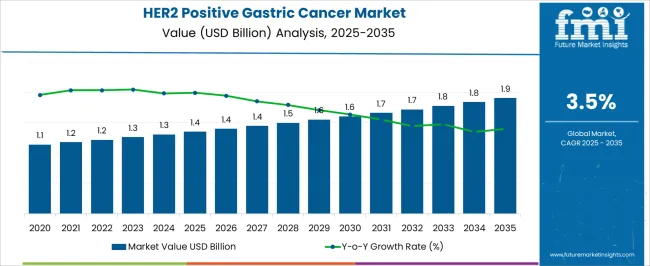
| Metric | Value |
|---|---|
| HER2 Positive Gastric Cancer Market Estimated Value in (2025 E) | USD 1.4 billion |
| HER2 Positive Gastric Cancer Market Forecast Value in (2035 F) | USD 1.9 billion |
| Forecast CAGR (2025 to 2035) | 3.5% |
The HER2 Positive Gastric Cancer market is undergoing significant transformation due to increased advancements in targeted treatment options and improved diagnostic pathways. The current landscape is shaped by a growing focus on precision oncology and biomarker-driven therapies, which have been emphasized across medical journals, clinical conference presentations, and biopharma investor briefings. Rising HER2 testing rates, particularly in newly diagnosed metastatic gastric cancer cases, are contributing to early identification and tailored treatment decisions.
Supportive regulatory policies and increased accessibility to biologics and monoclonal antibodies are also playing a pivotal role in expanding treatment coverage. As highlighted in clinical press releases and pharmaceutical R&D updates, the development of novel HER2 inhibitors and combination regimens is expected to drive clinical adoption further.
The market is also being supported by growing cancer prevalence, improved awareness among healthcare providers, and increasing uptake of patient-centric treatment protocols With innovation in biologic drug delivery and sustained focus on late-stage cancer management, the HER2 Positive Gastric Cancer market is positioned for long-term clinical and commercial growth.
The market is segmented by Therapy, Stage, and End-User and region. By Therapy, the market is divided into Targeted Therapy, Chemotherapy, Immunotherapy, and Radiation Therapy. In terms of Stage, the market is classified into Stage IV, Stage I, Stage II, and Stage III. Based on End-User, the market is segmented into Hospitals and Specialty clinics, Ambulatory surgery centers, and Others. Regionally, the market is classified into North America, Latin America, Western Europe, Eastern Europe, Balkan & Baltic Countries, Russia & Belarus, Central Asia, East Asia, South Asia & Pacific, and the Middle East & Africa.
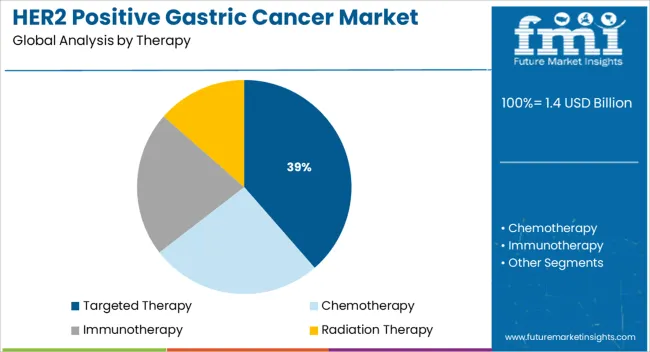
The targeted therapy segment is expected to account for 38.6% of the HER2 Positive Gastric Cancer market revenue share in 2025, emerging as the leading therapy type. This leadership position has been shaped by its ability to selectively inhibit HER2-positive cancer cell growth while minimizing damage to surrounding healthy tissues.
As outlined in pharmaceutical company statements and clinical oncology updates, targeted therapies have demonstrated superior clinical outcomes compared to conventional regimens, particularly in patients with advanced disease. The preference for these therapies has been reinforced by their role in extending progression-free and overall survival rates, making them a standard component in treatment protocols.
Adoption has also been supported by physician confidence, favorable reimbursement coverage, and a rising number of patients undergoing HER2 testing These factors, combined with a robust late-stage development pipeline, have ensured the segment’s continued growth and relevance in clinical practice.
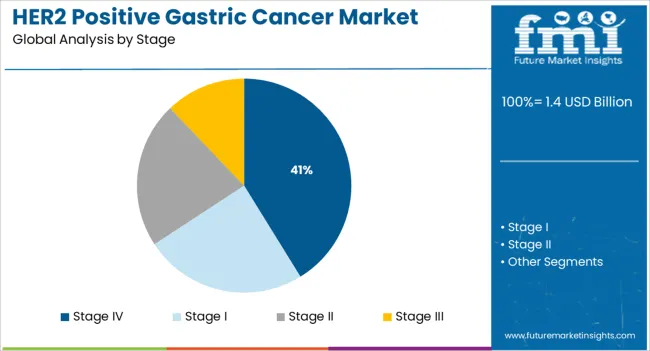
The stage IV segment is projected to hold 41.2% of the HER2 Positive Gastric Cancer market revenue share in 2025, solidifying its position as the dominant disease stage segment. This prominence has been driven by the high proportion of patients diagnosed at an advanced stage, as reported by oncology institutions and hospital networks.
Treatment in stage IV requires more aggressive therapeutic intervention, leading to increased adoption of HER2-targeted biologics and immunotherapy combinations. The segment’s growth is further supported by evolving treatment guidelines, which now include HER2-directed therapies as a key option in metastatic cases.
Real-world studies and treatment audits have highlighted improved patient outcomes with early integration of targeted agents, especially in late-stage settings In addition, rising clinical awareness, standardized testing protocols, and expanding access to specialized cancer centers are key factors supporting this segment’s sustained share in the market.
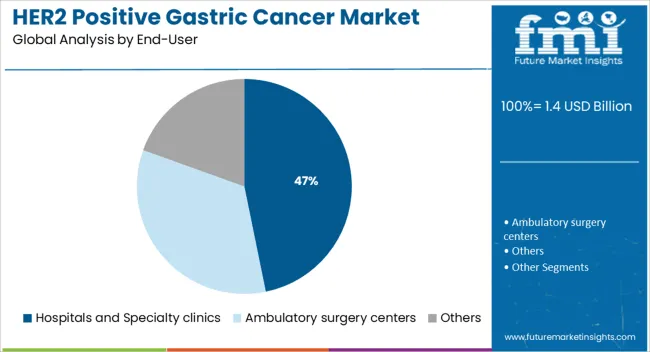
The hospitals and specialty clinics segment is forecasted to capture 46.8% of the HER2 Positive Gastric Cancer market revenue share in 2025, establishing itself as the leading end-user segment. This dominance has been attributed to the complex and resource-intensive nature of HER2-targeted therapy administration, which typically requires multidisciplinary care, advanced diagnostic support, and infusion capabilities available in tertiary care centers.
Institutional preference has been reinforced by the presence of experienced oncology specialists, availability of clinical trial programs, and access to the latest biologic treatments under hospital-based formularies. Moreover, hospitals and specialty clinics are better equipped to manage therapy-related adverse events, monitor disease progression, and offer patient education programs.
Health system consolidation trends and increased investment in specialty oncology care infrastructure have further expanded capacity and treatment outreach These dynamics have collectively contributed to the segment’s leadership and continued relevance in managing HER2 Positive Gastric Cancer cases.
The HER2-positive gastric cancer market is expected to gain market growth in the forecast period of 2025 to 2035. Latest market analysis by FMI the market is to grow at a CAGR of 3.5% in the above-mentioned forecast period.
The stomach cancer cells have too much of a growth-promoting protein called HER2 on their surface. Cancers with increased levels of HER2 are called HER2-positive. Drugs that target the HER2 protein can often be helpful in treating these cancers.
Over the coming years, the soaring emphasis on the development of more effective treatment procedures and advanced drugs is projected to foster the HER2-positive gastric cancer market.
The Approval of New Targeted and Immunotherapy Drugs Is Expected to Fuel the Market Growth During the Forecast Period
The increasing incidence of adenocarcinoma, lymphoma, and gastrointestinal stromal tumors across the globe. Major drivers for the stomach cancer market are treatment advancements, combination therapies, an increasing number of cancer treatment centers
Quick approvals from the regulatory authorities regarding HER2-positive gastric cancer drugs may bring immense growth prospects for the gastric cancer drugs market. Research and development activities play an important role in developing novel drugs and therapies.
For instance, in January 2024, the USA FDA approved Enhertu, an antibody-drug conjugate product for treating HER-2-positive metastatic gastric cancers.
Increasing Healthcare Awareness to Boost the Market Growth
Health awareness amongst the population is rising which results in the prediction of drugs boosting the market growth. The innovative launches in medications for treating HER 2-positive gastric cancer are expected to prompt the market simultaneously.
Different researchers are investing in launching drugs that benefit the market. This creates more opportunities in the market. An increase in the incidence of gastrointestinal tumors, lymphoma, and adenocarcinoma; a rise in alcohol consumption, a surge in smoking, and an increase in the geriatric population are anticipated to boost the growth of the global HER 2 positive gastric cancer testing market during the forecast period.
Stringent Government Regulation for Drug Approval May Restrain The Market Growth
Despite a positive growth trajectory, the global HER2-positive Gastric Cancer market is facing various challenges that are likely to pose a threat to its growth during the forecast period.
The lack of understanding of intratumoral heterogeneity, erosion in innovator sales, like the launch of biosimilars, and lack of universal guidelines for the assessment of HER2 overexpression or amplification may restrain the growth of the market during the forecast period.
The lack of adequate financial assistance from health insurance policies and stringent regulatory procedures for approving the complex nature of radiation devices are the major factors that can hamper the gastric cancer market growth over the forecast period.
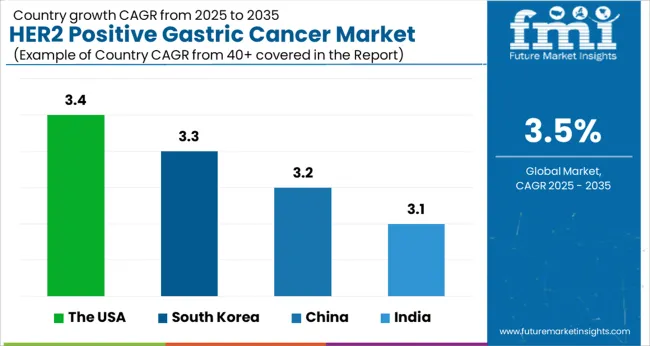
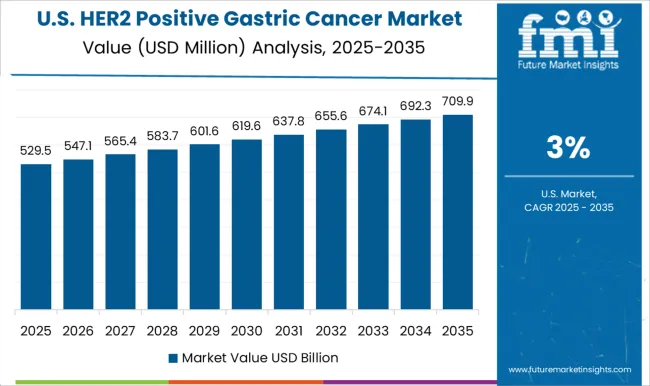
Increasing cancer cases in the region drive the market growth in North America
North America dominated the market and accounted for the largest revenue share of around 3.4% in 2025. The rising prevalence of gastric cancer is driving the growth of the HER2-positive gastric cancer market in North America.
Gastric cancer is the third leading cause of cancer mortality with a five-year survival rate of 5% for metastatic disease.1,2 Approximately one in five gastric cancers are considered HER2 positive. An estimated 27,600 new cases of gastric cancer will be diagnosed this year and the disease could lead to more than 11,000 deaths in the USA in 2024.
Thus, the increasing number of gastric cancer cases in the region is expected to rise the demand for effective therapies for treating patients with gastric cancer which in turn is anticipated to fuel the market growth over the forecast period.
The rising adoption of targeted cancer therapy and the availability of advanced technology in cancer research and treatment centers boost the market growth in the region.
For instance, in May 2024 AstraZeneca and Daiichi Sankyo Company, Limited has been granted Orphan Drug Designation (ODD) in the USA for the treatment of patients with gastric cancer, including gastroesophageal junction cancer.
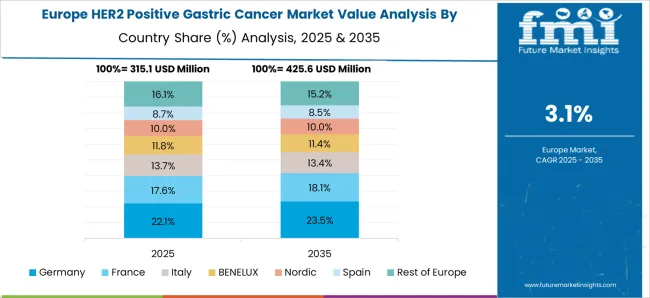
Increase in Significant Research and Development Investments in Healthcare to Boost the Market Growth
Europe is estimated to witness considerable growth during the forecast period due to increasing investments in the development of advanced treatment options and the rising target patient population.
Furthermore, the rising company activities in conducting clinical trials for developing effective drugs for patients suffering from HER2-positive gastric cancer as well as increasing product launches and approvals in the region are expected to fuel the market growth.
For instance, AstraZeneca and Daiichi Sankyo’s Enhertu (trastuzumab deruxtecan) has been approved in the European Union (EU) as monotherapy for the treatment of adult patients with advanced HER2-positive gastric or gastroesophageal junction (GEJ) adenocarcinoma who have received a prior trastuzumab-based regimen.
Advancement in Healthcare to Propel the Market Growth
Asia Pacific is anticipated to expand at the fastest CAGR of % during the forecast period. Rapid growth in global demand for drugs has encouraged major drug manufacturers to set up facilities for manufacturing Research and Development in this region. Initiatives undertaken by various organizations to create awareness, educate people, and raise funds for the disease are anticipated to propel regional growth.
Furthermore, advancements in healthcare infrastructure, rising government spending on healthcare policies, and the presence of important members in Asia Pacific all contribute to the growth of the global HER2-positive gastric cancer market.
Country-wise Forecast CAGRs for the HER2 Positive Gastric Cancer Market
| The UK | 3.3% |
|---|---|
| India | 3.1% |
| South Korea | 3.3% |
| China | 3.2 % |
| The USA | 3.4 % |
Targeted Therapy Segment remains dominant among other types
Based on the therapy, the targeted therapy accounted for the largest market share in 2025. This is attributed to the increased adoption of targeted therapy along with the chemotherapy and rise in awareness regarding combination therapies for gastric cancer. HER-2 inhibitor trastuzumab is the only molecular targeted drug approved by the USA Food and Drug Administration (FDA) for the first-line treatment of HER-2-positive advanced gastric cancer. The segment held a revenue share of over 55.4% in 2025
Therefore, the rising prevalence of gastric cancer and increased usage of targeted therapy in combination with different other therapies has fostered the growth of this segment in the past few years.
Immunotherapy is estimated to be the fastest-growing segment during the forecast period. The rising awareness among patients regarding the effectiveness and benefits of immunotherapy over chemotherapy is expected to boost the growth of this segment. The growing focus of the manufacturers and the active participation of the authorities like the FDA and EMA in the approval of immunotherapy drugs is expected to augment the demand for immunotherapy drugs for the treatment of Her2-positive gastric cancer.
Hospital and Speciality Clinics Dominated the Market
The Hospital and speciality clinics segment dominated the Her 2 positive gastric cancer therapy market in 2025 with a revenue share of over 35.0%. Initiatives by regional governments to develop healthcare infrastructure is expected to drive the segment growth during the forecast period. Based on the end-user, the market has been segmented into hospitals and speciality and ambulatory surgery centres.
The ambulatory surgery centre segment accounted for the second-largest share in 2024. Most patients with gastric cancer undergo inpatient administration of treatment in developing nations. This is one of the major factors fueling the growth of this segment.
How do New Entrants Contribute to the HER2 Positive Gastric Cancer Market?
With technological innovations happening at a rapid pace, and companies looking for ways to increase customer engagement, start-ups are taking all possible steps to establish a name for themselves in the HER2-positive Gastric Cancer market.
Some of the start-ups in the HER2-positive Gastric Cancer market include-
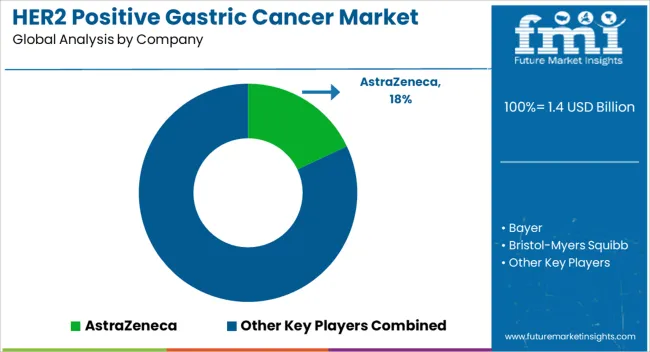
Key pharmaceutical companies that are working efficiently in the HER2-positive Gastric Cancer space include names like AstraZeneca, Bayer, Bristol-Myers Squibb, Hutchison Medipharma, LintonPharm, Shanghai Henlius Biotech, Sanofi, Pfizer, Novartis AG, and others.
The manufacturers are involved in the production of HER2-positive Gastric Cancer in a larger capacity. Research and innovation are also conducted to launch innovative products for HER2-positive Gastric Cancer.
Also, some of the key players are acquiring small pharmaceutical companies to increase their production capacity. Suppliers are focusing on expanding their market presence across the world by initiating new product launches and boosting sales.
| Report Attribute | Details |
|---|---|
| Growth Rate | CAGR 3.5% from 2025 to 2035 |
| Expected Market Value (2025) | USD 1.4 billion |
| ProjectedForecast Value (2035) | USD 1.9 billion |
| Base Year for Estimation | 2025 |
| Historical Data | 2020 to 2025 |
| Forecast Period | 2025 to 2035 |
| Quantitative Units | Revenue in USD Million & CAGR from 2025 to 2035 |
| Report Coverage | Revenue Forecast, Volume Forecast, Company Ranking, Competitive L&scape, Growth Factors, Trends & Pricing Analysis |
| Segments Covered | Therapy, Stage, End-user, Regions |
| Regions Covered | North America; Latin America; Western Europe; Eastern Europe; Asia-Pacific; Middle East & Africa (MEA) |
| Key Countries Profiled | The USA, Canada, Brazil, Mexico, Benelux, France, Germany, Italy, Nordic, Spain, The UK, Poland, Russia, India, Malesia, Singapore, Thailand, Australia, New Zealand, GCC, South Africa, Israel |
| Key Companies Profiled | AstraZeneca; Bayer; Bristol-Myers Squibb; Ono Pharmaceutical Co. Ltd; Hutchison Medipharma; LintonPharm; Shanghai Henlius Biotech; Sanofi; Pfizer; Novartis AG |
| Customization | Available Upon Request |
The global HER2 positive gastric cancer market is estimated to be valued at USD 1.4 billion in 2025.
The market size for the HER2 positive gastric cancer market is projected to reach USD 1.9 billion by 2035.
The HER2 positive gastric cancer market is expected to grow at a 3.5% CAGR between 2025 and 2035.
The key product types in HER2 positive gastric cancer market are targeted therapy, chemotherapy, immunotherapy and radiation therapy.
In terms of stage, stage iv segment to command 41.2% share in the HER2 positive gastric cancer market in 2025.






Our Research Products

The "Full Research Suite" delivers actionable market intel, deep dives on markets or technologies, so clients act faster, cut risk, and unlock growth.

The Leaderboard benchmarks and ranks top vendors, classifying them as Established Leaders, Leading Challengers, or Disruptors & Challengers.

Locates where complements amplify value and substitutes erode it, forecasting net impact by horizon

We deliver granular, decision-grade intel: market sizing, 5-year forecasts, pricing, adoption, usage, revenue, and operational KPIs—plus competitor tracking, regulation, and value chains—across 60 countries broadly.

Spot the shifts before they hit your P&L. We track inflection points, adoption curves, pricing moves, and ecosystem plays to show where demand is heading, why it is changing, and what to do next across high-growth markets and disruptive tech

Real-time reads of user behavior. We track shifting priorities, perceptions of today’s and next-gen services, and provider experience, then pace how fast tech moves from trial to adoption, blending buyer, consumer, and channel inputs with social signals (#WhySwitch, #UX).

Partner with our analyst team to build a custom report designed around your business priorities. From analysing market trends to assessing competitors or crafting bespoke datasets, we tailor insights to your needs.
Supplier Intelligence
Discovery & Profiling
Capacity & Footprint
Performance & Risk
Compliance & Governance
Commercial Readiness
Who Supplies Whom
Scorecards & Shortlists
Playbooks & Docs
Category Intelligence
Definition & Scope
Demand & Use Cases
Cost Drivers
Market Structure
Supply Chain Map
Trade & Policy
Operating Norms
Deliverables
Buyer Intelligence
Account Basics
Spend & Scope
Procurement Model
Vendor Requirements
Terms & Policies
Entry Strategy
Pain Points & Triggers
Outputs
Pricing Analysis
Benchmarks
Trends
Should-Cost
Indexation
Landed Cost
Commercial Terms
Deliverables
Brand Analysis
Positioning & Value Prop
Share & Presence
Customer Evidence
Go-to-Market
Digital & Reputation
Compliance & Trust
KPIs & Gaps
Outputs
Full Research Suite comprises of:
Market outlook & trends analysis
Interviews & case studies
Strategic recommendations
Vendor profiles & capabilities analysis
5-year forecasts
8 regions and 60+ country-level data splits
Market segment data splits
12 months of continuous data updates
DELIVERED AS:
PDF EXCEL ONLINE
Positive Patient Identification Market Size and Share Forecast Outlook 2025 to 2035
Positive Airway Pressure Devices Market Size and Share Forecast Outlook 2025 to 2035
Positive Displacement Blowers Market Size and Share Forecast Outlook 2025 to 2035
Positive Displacement Sanitary Pumps Market Size and Share Forecast Outlook 2025 to 2035
Positive Air Pressure Devices Market Size and Share Forecast Outlook 2025 to 2035
Positive Displacement Pumps Market Growth - Trends & Forecast 2025 to 2035
Continuous Positive Airway Pressure (CPAP) Market Analysis – Size, Share & Forecast Outlook 2025 to 2035
OPEP Device Market Analysis – Growth & Forecast 2024-2034
UK Continuous Positive Airway Pressure (CPAP) Market Trends – Growth, Demand & Analysis 2025-2035
BRCA Mutation-Positive Ovarian Cancer Market
NTRK Fusion Gene Positive Advanced Solid Tumors Market Size and Share Forecast Outlook 2025 to 2035
India Continuous Positive Airway Pressure (CPAP) Market Trends – Size, Share & Growth 2025-2035
China Continuous Positive Airway Pressure Devices Market Outlook – Share, Growth & Forecast 2025-2035
Germany Continuous Positive Airway Pressure (CPAP) Market Insights – Size, Trends & Forecast 2025-2035
United States Continuous Positive Airway Pressure (CPAP) Market Report – Trends, Demand & Forecast 2025-2035
Cancer Registry Software Market Size and Share Forecast Outlook 2025 to 2035
Cancer Biological Therapy Market Size and Share Forecast Outlook 2025 to 2035
Cancer Diagnostics Market Analysis - Size, Share and Forecast 2025 to 2035
Cancer Biopsy Market - Growth & Technological Innovations 2025 to 2035
Cancer Vaccines Market Analysis by Technology, Treatment Method, Application and Region from 2025 to 2035

Thank you!
You will receive an email from our Business Development Manager. Please be sure to check your SPAM/JUNK folder too.
Chat With
MaRIA